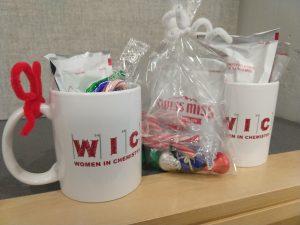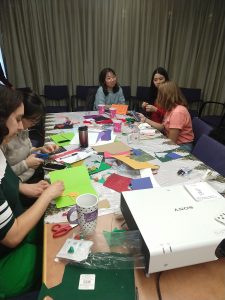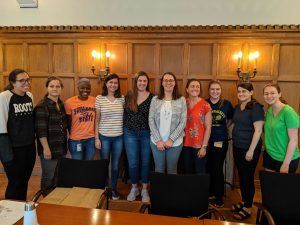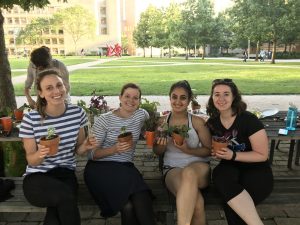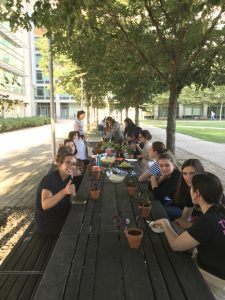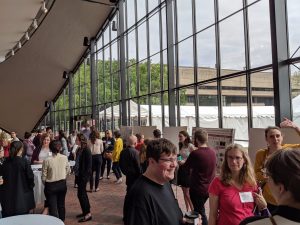On December 16th, WIC held a community holiday event filled with hot chocolate, coffee, and crafts! It was an opportunity to relax away from the stress of lab, classes, and TAing while enjoying a cozy drink. With mugs, chocolates, and other sweets, grad students and postdocs made gifts and cards for their mentees, friends, and staff members.
Category: 2019
Cassandra Zentner and Francesca Vaccaro honored with inaugural Department Service Award
WIC was proud to see two of our active members honored with the inaugural Departmental Service Award, which seeks to recognize outstanding contributions to the department. In an effort to recognize often invisible labor and celebrate the students who go above and beyond to make the department a welcoming place for all students, we are sharing the nominations for both Cassie and Francesca.
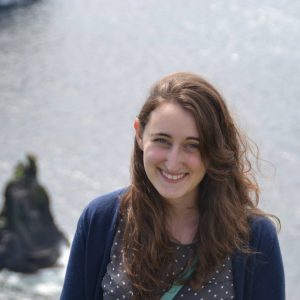
About Cassie, Christine and Katherine write:
Cassie Zentner is a ubiquitous presence during the first two years for many graduate women in the department. Whether you can put a face to her name or not, she has a hand in helping you through your first year at MIT, your second year orals, and helping you become established in the department. Cassie revamped the Women in Chemistry mentorship program beginning two years ago, as a second year. She has implemented better matching criteria and new events to build community, and carried on the tradition of a first year dinner. She is engaged in individual department members’ growth and struggles, and is always willing to volunteer her time or knowledge for new projects. Outside of Women in Chemistry, Cassie has served as an excellent support to TAs, providing them with the tools they need to effectively teach 5.12. She was always happy to meet when I was a first year Head TA for fall and spring 5.12 and gave me helpful notes on what to expect. With all that she does for the department, as both an individual and a member of WIC, Cassie never wants to be singled out for praise, and is exceedingly humble. She does many types of invisible service, where only those who work with her directly might notice. This type of service is invaluable, yet is not often enough recognized, and through this service Cassie has enhanced her lab, WIC, and the department as a whole.
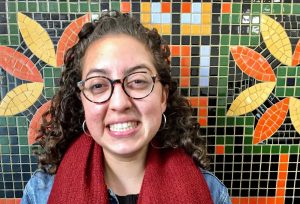
About Francesca, Mani Mengiste writes:
Simply put, my first year at MIT would not be the same without the constant support and friendship of Francesca. I know that many fellow first years would agree.In addition to constantly taking the time to meet with many of us over a meal (one-on-one), she helped welcome us to WIC and CADI by independently organizing hangouts. In October, she organized a pumpkin carving party at her place of residence and brought together many graduate students and post-docs over a fun activity. That night was particularly important for many of us (first-years) because we got a chance to talk to older graduate students about the groups that we were thinking about joining in a way that did not feel very forced. She introduced us to other members of the MIT Chemistry community who have since become part of our larger support network. She has also constantly worked to build/improve CADI. As a student of color, the events that Francesca helped organize have made me feel welcome and loved.
WIC Lunch with Cynthia Parrish from GSK
On Monday August 19th, Cynthia Parrish from GSK hosted a lunch with WIC. Members learned about her experiences in industry, working for a large pharma company, and what life is like after 18 years postgrad. Cynthia discussed her efforts to elevate women at GSK, stressed continual focus on growth throughout your career, and discussed opportunities that GSK provides in both of those areas.
A Conversation with Prof. JoAnne Stubbe
JoAnne Stubbe was recently awarded the Priestley Medal, the American Chemical Society’s highest honor. This award continued a long record of recognition for Stubbe’s outstanding career studying the importance and central role of radicals in biology. Yet when asked about her history of accolades and honors, Stubbe expressed nothing but humility and was quick to redirect, pointing out that there are many excellent scientists out there, pondering, “how do you differentiate between [them]?” Rather than eulogizing about her achievements, Stubbe asserted that her greatest award was that “somebody paid [her] to do what [she] really love[s] to do for [her] whole career.”
We had the pleasure of sitting down with JoAnne to learn more about the career to which she committed her life, her experience as a woman in chemistry at MIT, and the need to keep moving the field forward.
According to Stubbe, she “didn’t learn anything in graduate school”. But she did find there the inspiration that would help determine the path of her career. Stubbe was undergoing training as an organic chemist, but became interested in enzymology when she attended a seminar about the cyclization of squalene. At the end of the seminar, she left thinking, “why the hell would I ever want to do synthesis? If an enzyme can do this at pH 7 and give you 100% yield with all the stereochemistry?” She also read Tipper and Strominger’s work on the mechanism of action of penicillins. Penicillin, which looks like the dipeptide D-alanine -D-alanine found in peptidoglycans, was one of the first examples of a mechanism-based inhibitor. This mechanistic approach to understanding enzymatic reactions and their role in biology was what Stubbe was most excited about, even if, at the time, she wasn’t able to get credit for biochemistry courses. Despite the enormous contribution that she would later make to the field, she never took a formal biology or microbiology course. Instead, she followed her passions and sought out the knowledge and training she needed to study the questions she wanted to answer. Throughout her career, Stubbe spent her sabbaticals at the bench, where she worked to learn methodology that she felt was important to master in order to ask the right questions.
The pursuit of asking those questions led Stubbe to her first position as a professor at Williams College, an undergraduate school where she was the first to ever be awarded an NIH grant. Despite having great experiences with her students there, Stubbe says she was “so starved to talk science to people” that she obtained funding for a leave of absence in enzymology at Brandeis and then continued on to become a faculty member in Pharmacology at Yale Medical School and then in Biochemistry at the University of Wisconsin-Madison. In 1987, she joined the Chemistry Department at MIT. Throughout her tenure, she has been a catalyst for change for women in chemistry, acknowledging that she has seen the department evolve “tremendously, but really very slowly”.
Early on, Stubbe felt that she “probably won awards because [she] was female”, a feeling familiar to many women, even today. But it was the Nancy Hopkins Report that really brought women’s issues at MIT into the forefront. The report, published in 1999, was spearheaded by Professor Nancy Hopkins and documented the reduced access to resources for female professors at MIT compared to their male counterparts. Stubbe was one of the 16 women faculty members on the first committee that, in 1994, penned a proposal to the Dean of Science to review space, resources, salaries, and teaching assignments of women faculty compared to their male colleagues. A true scientist, Stubbe recalls that “we got data, there was clear discrimination.” The report catalyzed changes at MIT and beyond. Some notable changes at MIT include access to daycare on campus and progressive policies for family leave. Stubbe recognizes that many women at various institutions had tried to address discrimination earlier, but the Hopkin’s report likely gained traction because, as Stubbe points out, “three letters make a big difference”—MIT.
Looking to the future, Stubbe thinks we need to make fundamental changes in the way we train chemists. With the rapid advancement of technology and the explosion of research published every day, we need to focus on training critical thinkers with broad foundational knowledge. Stubbe points out, “if you stay in science or if you go into writing or some other aspect, you still have to keep up with what is going on.” One challenge is how to identify good publications and critically assess the current literature. Another issue, Stubbe thinks, is the siloed division system that still exist in the Chemistry Department, rather she believes that it is important for students to build strong foundational knowledge across chemistry, biology, and other interfaces to be able to ask the most critical questions.
Still, JoAnne believes MIT is a place like no other. “[You] look at the website every day, and you see some amazing discovery that they have on that page. It’s sort of like, you pinch yourself to realize you’re in a place full of such smart people. And again, even if you don’t know them, if you use your energy, if you’re really excited about what you do, you can do experiments you could never have done at most places. And so that’s what’s special about that.”
While many agree there is still work to be done in the MIT Chemistry Department and the field as a whole, my perspective as a current graduate student is that we have seen positive changes in recent years. Continuing the trend of diversifying hiring practices, the chemistry department has hired three female faculty in the past two years: Xiao Wang, Allison Wendlandt, and Laura L. Kiessling. And as department head, Professor Tim Jamison was dedicated to making positive change in the department. Among his efforts, he spearheaded a harassment training program that is now being implemented in more departments across MIT. Notably, these changes have made an impact, and this fall, for the first time ever, MIT Chemistry’s incoming graduate cohort is more than half women.
By Christine Isabella
This article has been modified since original publishing to better represent JoAnne’s views. In particular, wording was changed to clarify JoAnne’s career steps, and to reflect that she has always been aware of women’s issues in science. The final paragraph has been moved and changed to reflect that they represent the author’s views of the current state of the department.
WIC Lunch with Anne-Catherine Bédard from Dow August 14th, 2019
Jamison group alumna Anne-Catherine Bédard visited campus with Dow for recruiting events and took the time to sit down for lunch with Women in Chemistry. Erica Tsai coordinated the lunch and 12 graduate students attended. We had a great conversation about working in industry, and discussed the types of research projects you can lead, opportunities for advancement, and being a woman at Dow. We’re thankful to Anne-Catherine for taking the time to stop by!
WIC Travel Grant Summary – Rebecca Sebastian – GRC on Stress Proteins in Growth, Development
Gordon Research Conference on Stress Proteins in Growth, Development and Disease, Italy
Thanks to the travel grant from WIC, I was able to attend the Gordon Research Conference and Gordon Research Seminar on Stress Proteins in Growth, Development and Disease in Lucca, Italy. This conference was focused on proteostasis and stress response mechanisms, with talks on topics ranging from biochemical mechanisms of chaperones to developing pharmacological inhibitors of HSF1 for clinical applications. Attending these lectures was invaluable in expanding my awareness of the current research within my field, and I enjoyed hearing sneak previews of unpublished work.
During the conference, I presented a poster on the intersection of SUMOylation and HSF1 regulated chaperone networks during heat shock. My poster was also selected for a short presentation during a poster preview session, which challenged me to summarize critical findings within a 90 second talk. This was my first time presenting a poster and speaking to such a large audience, and I was glad for the opportunity to improve my communication skills. While presenting my poster I received valuable feedback from other professors and other graduate students, including several ideas for new experimental directions that I look forward to implementing.
Attending this conference also gave me a chance to network with graduate students and postdocs at a similar position along their research careers. In particular, the associated Gordon Research Seminar provided graduate students an informal setting to present their research and engage in scientific discussions, which prompted more engagement from early career scientists. Overall, this conference has given me perspective not only on the current research opportunities within my field, but also the diversity of academic life. As I enter my fourth year of graduate school, these conversations and experiences will be helpful in shaping my own career decisions. I would like to take this opportunity to thank WIC once again for their generous support.
WIC Travel Grant – Olivie Fiebig – GRS/GRC on Photosynthesis
Through the support of WIC, I was able to attend the Gordon Research Seminar and Conference on Photosynthesis in Newry, Maine. Gordon Research Conferences (GRCs) are week-long conferences focused on a highly specific topic. The GRC is the main conference that includes professors, while the Gordon Research Seminar (GRS) is a day and a half conference specifically for graduate students and postdocs, allowing them to share their work with their peers.
I was selected to give a talk at the GRS and a poster at the GRC. This was my first time attending a conference in graduate school, let alone giving a talk, and it was a great experience. I received excellent feedback on my presentation and my work that will help me determine future directions of my project. Additionally, I met many professors, postdocs, and students from the photosynthesis community and learned about the fascinating research they are doing. Even in a supposedly narrow field like photosynthesis, there is a wide variety of research going on, and I heard talks on topics I previously had known little about. I also made professional connections and potential collaborations that will be beneficial to me as I enter the last few years of my PhD.
Thank you to WIC for generously supporting my attendance at the GRS and GRC!
WIC Travel Grant – Stephanie Hart – International Conference on Photochemistry
I’m thankful for support from the WIC Professional Development Grant which allowed me to attend the 2019 International Conference on Photochemistry in Boulder, CO. The content of this conference spanned a broad range of photophysical and photochemical communities, with several sessions devoted to both ultrafast photophysical phenomena and photoredox catalysis, thus aligning well with my research interests. I presented a poster titled, “Enhancing transition metal photocatalytic efficiency with natural light-harvesting systems”, detailing my work on generation and photophysical characterization of biohybrid photocatalysts comprised of ruthenium polypyridyl complexes bound to red algae derived light-harvesting proteins. Given the breadth of this conference, I was able to disseminate these results within the context of both the spectroscopy and photoredox catalysis communities, which was critical to receiving useful feedback from other attendees and gleaning insight into potential new directions for this project.
In addition to an extensive number of talks within my area of research, this conference also afforded me the opportunity meet other PIs, post-docs, and graduate students in my field. This not only allowed for excellent scientific discussion, but also served to bring to my attention other scientific directions and career options I could pursue following graduate school. This conference also served as the all hands meeting for a large collaboration with Princeton and other universities associated with my photocatalysis work, and was thus an excellent opportunity to meet with collaborators and furtherdiscuss the scope of our research goals. While in Colorado I also spent a day climbing Mt. Massive, the second tallest mountain in the central Rockies.
Overall the International Conference on Photochemistry was an excellent first conference as a graduate student owing to its scope and size, and I am very grateful for WIC’s support of my attendance.
WIC Plant Potting Night
On July 24th, 2019, WIC hosted a summer plant potting social. Members of the department donated cuttings from their personal collections, and we all met outside the Koch center for an evening of plant potting, snacks, and music. Members picked their favorite plants and were given care instructions. It was a great mid-summer break from lab, and everyone got to take home a new desk plant!
Women in Chemistry Merck Symposium May 23rd, 2019
The MIT-Merck Women in Chemistry Symposium was held on May 23rd 2019. This event welcomed more than 100 scientists from MIT and Merck to share their research and discuss their experiences. The day kicked off with of rapid fire talks by students, followed by a panel of women at all stages in their Merck careers, and closed with a poster session. Cassandra Zentner from the Swager group, Cassie Jarvis from the Kiessling group, Hye Won “Hanna” Moon from the Radosevich group, and Yunjung Zhou from the Buchwald group presented research and the poster session featured over 15 posters from Merck and MIT. Thanks to Victoria Marando for, and to Merck for sponsoring this event!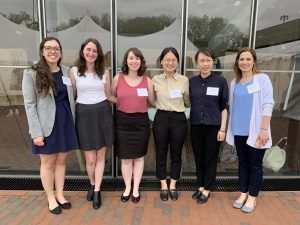
Photo courtesy of Rebecca Ruck (Merck).

